Module 11 Body language.Unit 3 Language in use.课件(20张PPT)
文档属性
| 名称 | Module 11 Body language.Unit 3 Language in use.课件(20张PPT) | 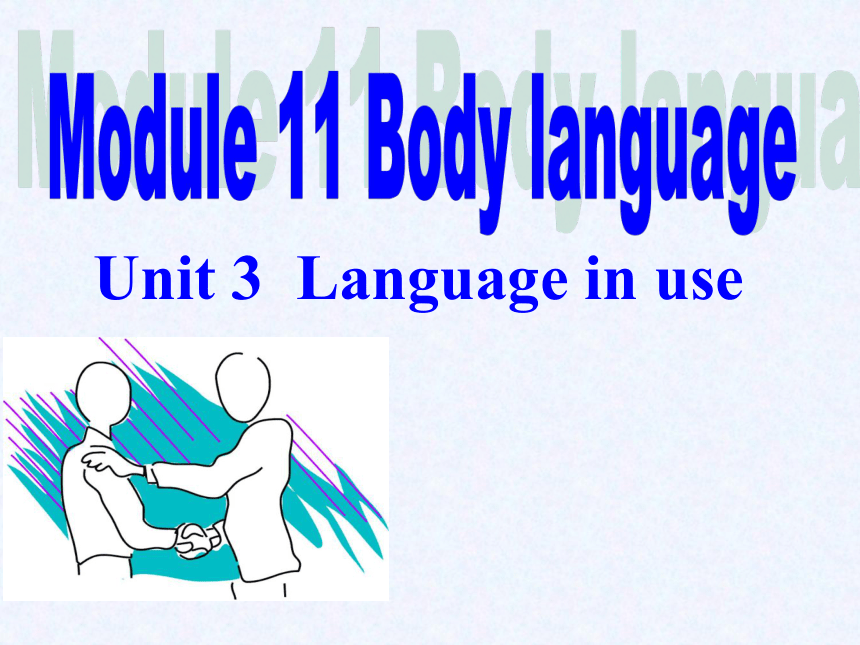 | |
| 格式 | ppt | ||
| 文件大小 | 8.9MB | ||
| 资源类型 | 教案 | ||
| 版本资源 | 外研版 | ||
| 科目 | 英语 | ||
| 更新时间 | 2019-06-27 21:59:32 | ||
图片预览

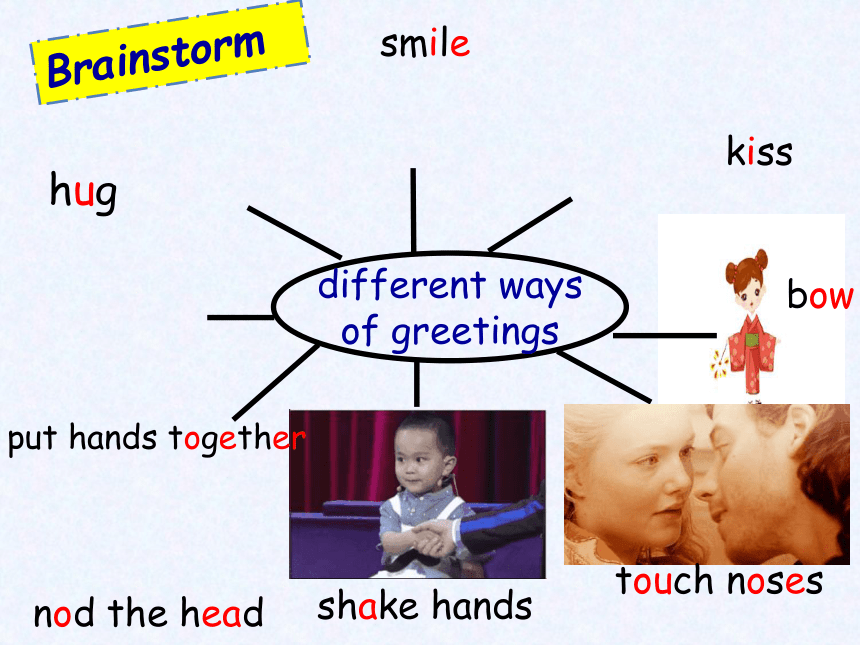

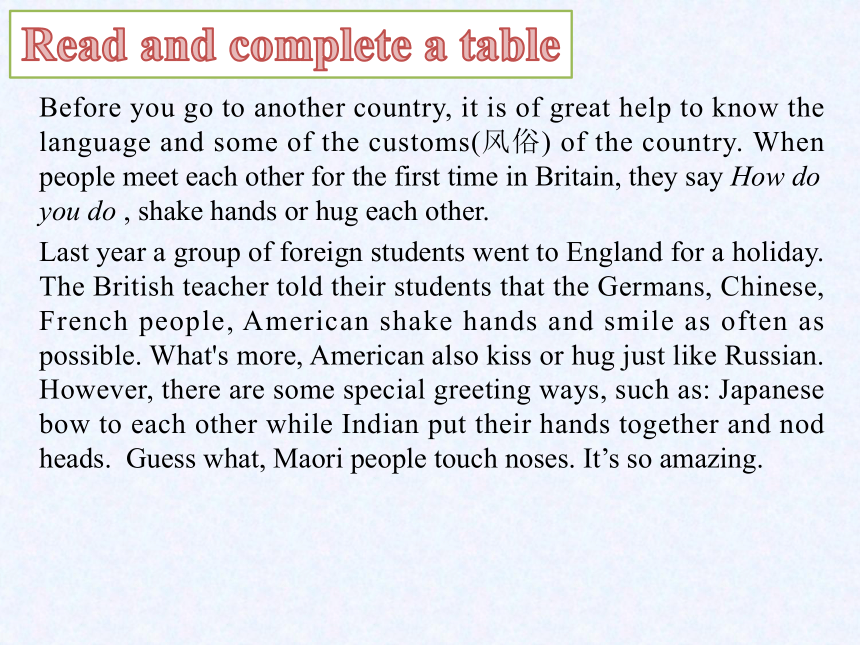
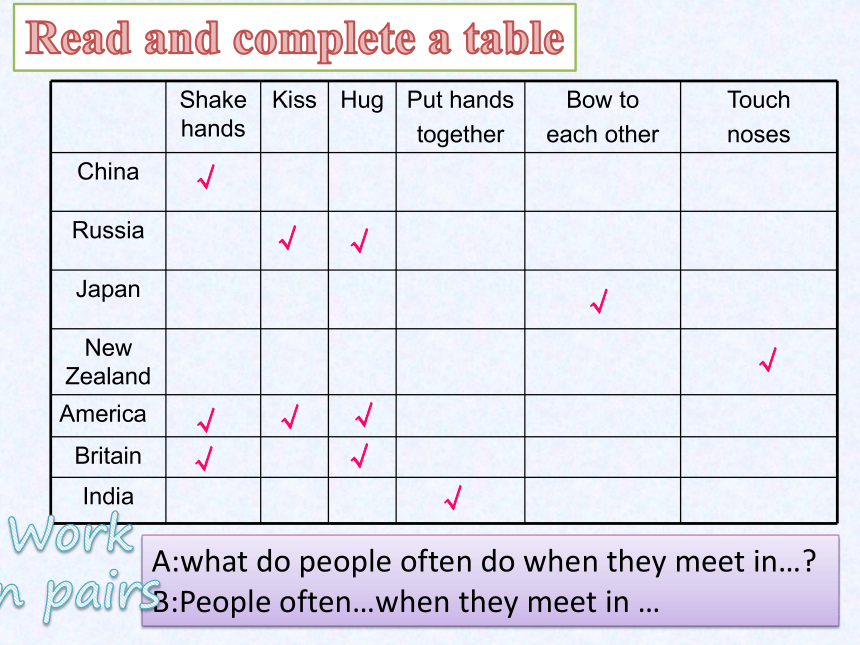

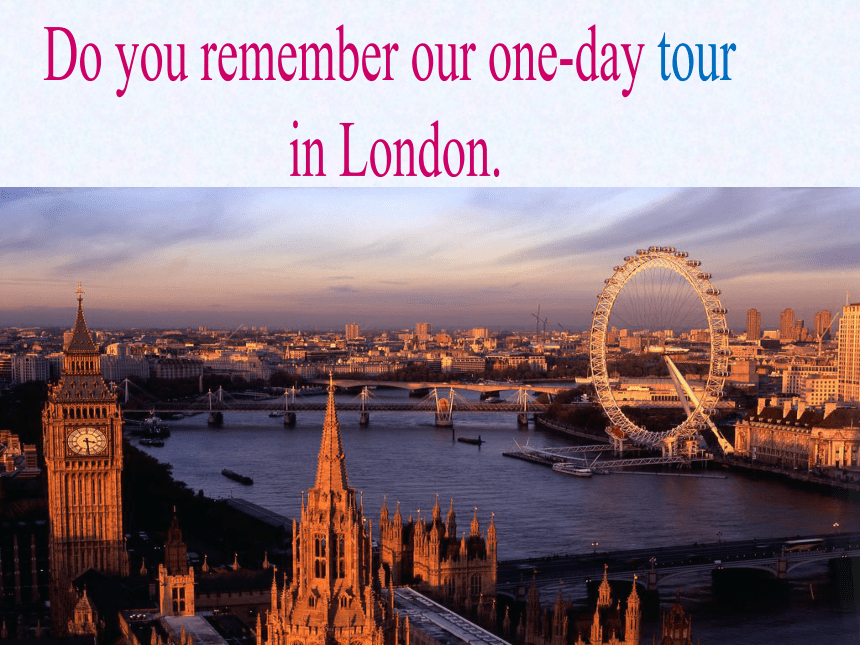
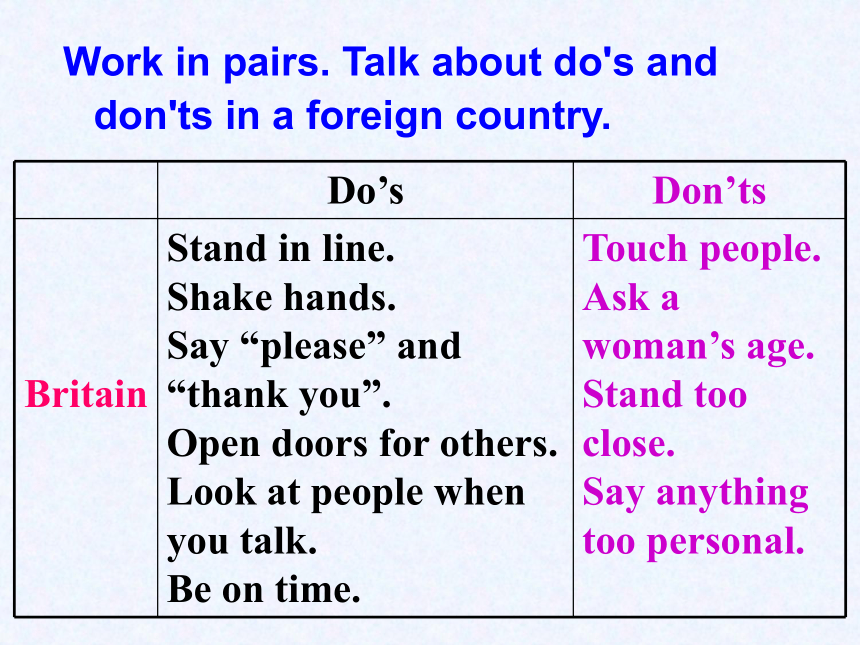
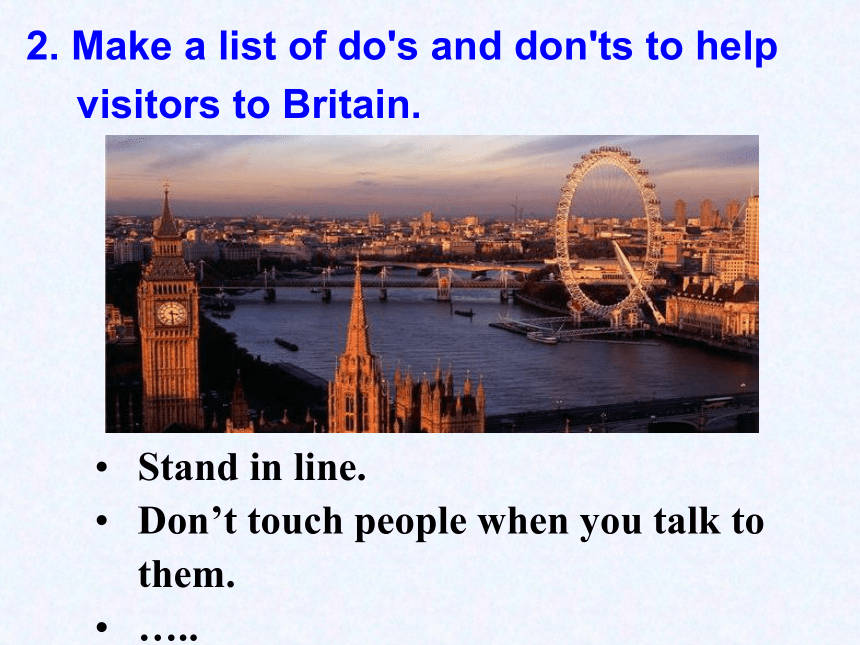
文档简介
(共20张PPT)
Unit 3 Language in use
different ways
of greetings
Brainstorm
touch noses
shake hands
nod the head
put hands together
hug
smile
kiss
bow
People do different things in different countries.
Chinese
China
British
Britain
French
France
German
Germany
Russian
Russia
Japanese
Japan
America
American
New Zealand
India
Indian
Maori
Before you go to another country, it is of great help to know the language and some of the customs(风俗) of the country. When people meet each other for the first time in Britain, they say How do you do , shake hands or hug each other.
Last year a group of foreign students went to England for a holiday. The British teacher told their students that the Germans, Chinese, French people, American shake hands and smile as often as possible. What's more, American also kiss or hug just like Russian. However, there are some special greeting ways, such as: Japanese bow to each other while Indian put their hands together and nod heads. Guess what, Maori people touch noses. It’s so amazing.
Shake hands Kiss Hug Put hands
together Bow to
each other Touch
noses
China
Russia
Japan
New Zealand
America
Britain
India
√
√
√
√
√
√
√
√
√
√
√
A:what do people often do when they meet in…
B:People often…when they meet in …
Pair work
Suppose there are many visitors visiting the UN(联合国)now. What will happen Make a dialogue with your partner.
A: Hello! Are you…
B: No, I’m…
A: What do people usually do
when they meet in…
B: In…they… What about you
A: I’m from…
B: Do people in your country…
A: Yes, they…/No, they…
Russia
China
America
India
Japan
New Zealand
Do’s Don’ts
Britain Stand in line.
Shake hands.
Say “please” and “thank you”.
Open doors for others.
Look at people when you talk.
Be on time. Touch people.
Ask a woman’s age.
Stand too close.
Say anything too personal.
Work in pairs. Talk about do's and don'ts in a foreign country.
Stand in line.
Don’t touch people when you talk to them.
…..
2. Make a list of do's and don'ts to help visitors to Britain.
Shake hands when you meet a friend.
Say “please” and “thank you”.
Open doors for others.
Look at people when you talk.
Be on time.
Things we can’t do
Things we can do
Imperative sentences
(祈使句)
Don’t touch people.
Don’t ask a woman’s age.
Don’t be late.
Don’t say anything too personal.
1.The subject of sentence is usually the second person, and it is commonly omitted.
2. structure
Affirmative form(肯定形式):
base form of verb + object
e.g. Open the door.
(2) Negative form(否定形式) :
Begin with do not or don’t
Don’t + base form of verb + object
e.g. Don’t open the door.
The rules of imperative sentences(祈使句)
Rewrite the sentences .
1.It’s important to be careful .
2.It’s important to clean and tidy the lab .
3.You cannot touch anything if the teacher doesn’t ask
you to .
4.You cannot bring food or drink into the lab .
5.You cannot enter the lab alone.
Be careful.
Clean and tidy the lab.
Don't touch anything if the teacher doesn't ask you to.
Don't bring food or drink into the lab.
Don't enter the lab alone.
Choose the correct answer.
1. __________, or you’ll be late.
A. Hurry up B. Take it down
C. To hurry up D. Hurries up
2. ________ talk loudly. The baby is sleeping right now.
A. Do B. Does
C. Don’t D. Doesn’t
A
C
3. Don’t _______ too much TV. It’s bad for your eyes.
A. watch B. watched
C. watching D. to watch
4. ________ sleep too late. It’s bad for your health.
A. Do B. Not
C. Don’t D. Please not
A
C
In Britain and the US
South Americans
walk arm in arm
Hold your arm
China
Middle East
look at each other when talking
Body language
stand close
温馨提示:连词成句,连句成篇。Have a try!
Some ways to welcome the foreign visitors
Don’t wave to say goodbye
In Greece
Example:
Look at people when talking in Britain.
Don’t stand close to people in the US.
Don’t touch each other in Britain.
Last summer, the students in our school took a holiday in New Zealand.
This summer, we are going to take a holiday in Korea.
Before this trip, what should we do
For example:
Before getting on the plane at airport, remember to take your ID Card.
During this trip, what should we do when you meet different foreign people
( Russian/American/ Japanese … )
For example:
Shake hands, smile and nod your heads when you meet Chinese.
Don’t kiss others. Only parents and children do that.
Look at people when you talk to others.
People wave to say goodbye. It’s a way of being polite in China.
People do different things in different countries.
When in Rome, do as Romans do .
(入乡随俗)
Learn to understand and respect.
学会理解,学会尊重。
A smile is the most beautiful language
in the world! 微笑是世上最美的语言。
Write a passage about your school rules.
Search for more information about body language around the world.
Unit 3 Language in use
different ways
of greetings
Brainstorm
touch noses
shake hands
nod the head
put hands together
hug
smile
kiss
bow
People do different things in different countries.
Chinese
China
British
Britain
French
France
German
Germany
Russian
Russia
Japanese
Japan
America
American
New Zealand
India
Indian
Maori
Before you go to another country, it is of great help to know the language and some of the customs(风俗) of the country. When people meet each other for the first time in Britain, they say How do you do , shake hands or hug each other.
Last year a group of foreign students went to England for a holiday. The British teacher told their students that the Germans, Chinese, French people, American shake hands and smile as often as possible. What's more, American also kiss or hug just like Russian. However, there are some special greeting ways, such as: Japanese bow to each other while Indian put their hands together and nod heads. Guess what, Maori people touch noses. It’s so amazing.
Shake hands Kiss Hug Put hands
together Bow to
each other Touch
noses
China
Russia
Japan
New Zealand
America
Britain
India
√
√
√
√
√
√
√
√
√
√
√
A:what do people often do when they meet in…
B:People often…when they meet in …
Pair work
Suppose there are many visitors visiting the UN(联合国)now. What will happen Make a dialogue with your partner.
A: Hello! Are you…
B: No, I’m…
A: What do people usually do
when they meet in…
B: In…they… What about you
A: I’m from…
B: Do people in your country…
A: Yes, they…/No, they…
Russia
China
America
India
Japan
New Zealand
Do’s Don’ts
Britain Stand in line.
Shake hands.
Say “please” and “thank you”.
Open doors for others.
Look at people when you talk.
Be on time. Touch people.
Ask a woman’s age.
Stand too close.
Say anything too personal.
Work in pairs. Talk about do's and don'ts in a foreign country.
Stand in line.
Don’t touch people when you talk to them.
…..
2. Make a list of do's and don'ts to help visitors to Britain.
Shake hands when you meet a friend.
Say “please” and “thank you”.
Open doors for others.
Look at people when you talk.
Be on time.
Things we can’t do
Things we can do
Imperative sentences
(祈使句)
Don’t touch people.
Don’t ask a woman’s age.
Don’t be late.
Don’t say anything too personal.
1.The subject of sentence is usually the second person, and it is commonly omitted.
2. structure
Affirmative form(肯定形式):
base form of verb + object
e.g. Open the door.
(2) Negative form(否定形式) :
Begin with do not or don’t
Don’t + base form of verb + object
e.g. Don’t open the door.
The rules of imperative sentences(祈使句)
Rewrite the sentences .
1.It’s important to be careful .
2.It’s important to clean and tidy the lab .
3.You cannot touch anything if the teacher doesn’t ask
you to .
4.You cannot bring food or drink into the lab .
5.You cannot enter the lab alone.
Be careful.
Clean and tidy the lab.
Don't touch anything if the teacher doesn't ask you to.
Don't bring food or drink into the lab.
Don't enter the lab alone.
Choose the correct answer.
1. __________, or you’ll be late.
A. Hurry up B. Take it down
C. To hurry up D. Hurries up
2. ________ talk loudly. The baby is sleeping right now.
A. Do B. Does
C. Don’t D. Doesn’t
A
C
3. Don’t _______ too much TV. It’s bad for your eyes.
A. watch B. watched
C. watching D. to watch
4. ________ sleep too late. It’s bad for your health.
A. Do B. Not
C. Don’t D. Please not
A
C
In Britain and the US
South Americans
walk arm in arm
Hold your arm
China
Middle East
look at each other when talking
Body language
stand close
温馨提示:连词成句,连句成篇。Have a try!
Some ways to welcome the foreign visitors
Don’t wave to say goodbye
In Greece
Example:
Look at people when talking in Britain.
Don’t stand close to people in the US.
Don’t touch each other in Britain.
Last summer, the students in our school took a holiday in New Zealand.
This summer, we are going to take a holiday in Korea.
Before this trip, what should we do
For example:
Before getting on the plane at airport, remember to take your ID Card.
During this trip, what should we do when you meet different foreign people
( Russian/American/ Japanese … )
For example:
Shake hands, smile and nod your heads when you meet Chinese.
Don’t kiss others. Only parents and children do that.
Look at people when you talk to others.
People wave to say goodbye. It’s a way of being polite in China.
People do different things in different countries.
When in Rome, do as Romans do .
(入乡随俗)
Learn to understand and respect.
学会理解,学会尊重。
A smile is the most beautiful language
in the world! 微笑是世上最美的语言。
Write a passage about your school rules.
Search for more information about body language around the world.
同课章节目录
- Module 1 Lost and found
- Unit 1 Whose bag is this?
- Unit 2 Are they yours?
- Unit 3 Language in use
- Module 2 What can you do ?
- Unit 1 I can play the piano
- Unit 2 I can run really fast
- Unit 3 Language in use
- Module 3 Making plans
- Unit 1 What are you going to do at the weekends?
- Unit 2 We're going to cheer the players.
- Unit 3 Language in use
- Module 4 Life in the future
- Unit 1 Everyone will study at home
- Unit 2 Every family will have a small plane.
- Unit 3 Language in use
- Module 5 Shopping
- Unit 1 What can I do for you?
- Unit 2 You can buy everything on the Internet
- Unit 3 Language in use
- Module 6 Around town
- Unit 1 Could you tell me how to get to the Nationa
- Unit 2 The London Eye is on your right.
- Unit 3 Language in use
- Revision module A
- Module 7 My past life
- Unit 1 I was born in a small village.
- Unit 2 I was born in Quincy.
- Unit 3 Language in use
- Module 8 Story time
- Unit 1 Once upon a time….
- Unit 2 Goldilocks hurried out of the house.
- Unit 3 Language in use
- Module 9 Life history
- Unit 1 He left school and began work at the age of
- Unit 2 He decided to be an actor.
- Unit 3 Language in use
- Module 10 A holiday journey
- Unit 1 What did you do?
- Unit 2 This morning we took a walk.
- Unit 3 Language in use
- Module 11 Body language
- Unit 1 They touch noses!
- Unit 2 Here are some ways to welcome them.
- Unit 3 Language in use
- Module 12 Western music
- Unit 1 It's so beautiful!
- Unit 2 Vienna is the centre of European classical
- Unit 3 Language in use
- Revision module B
